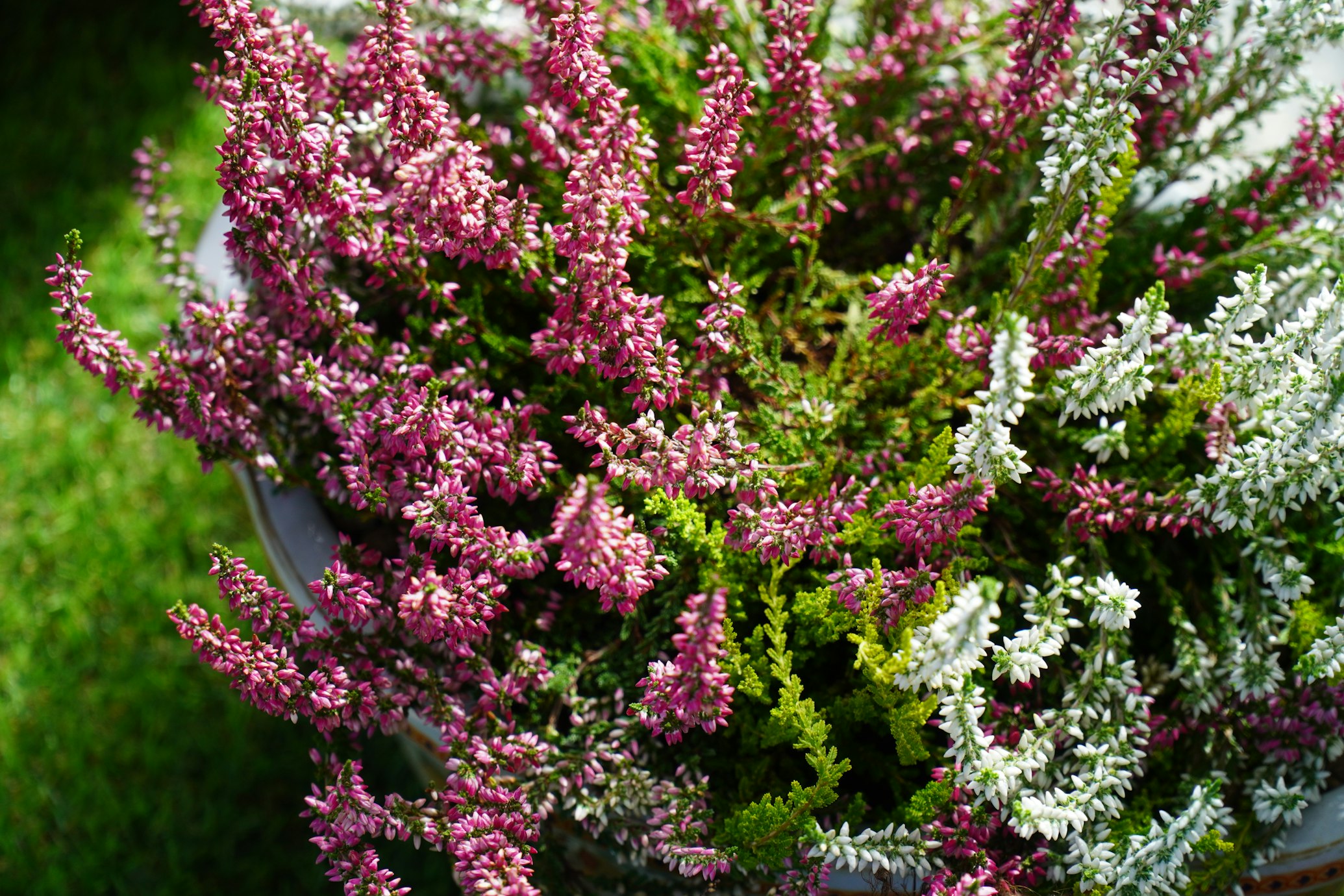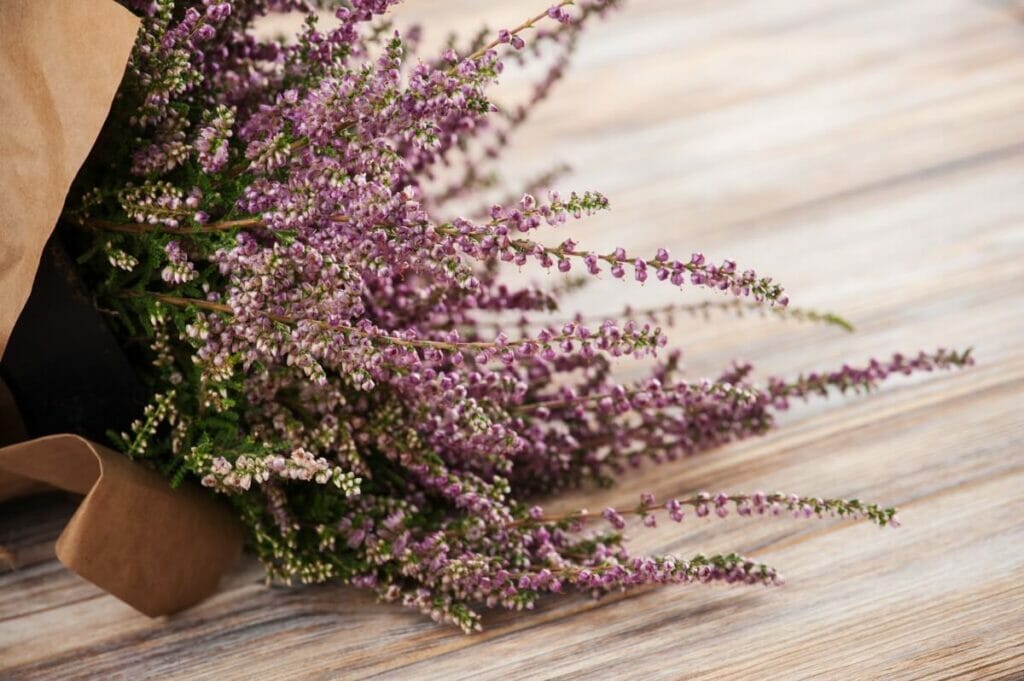Heather: The Flower That Symbolizes Wishes, Devotion, and Quiet Resilience
Heather plants (Calluna vulgaris) have become beloved for their bright colorful flowers and stunning leaves. But, there’s more to these plants than their beauty – they’re steeped in symbolism, with each color flower meaning different things, and the flowers are vital to Scottish culture. In this guide, I’ll walk you through the heather flower’s meaning and symbolism.

Etymological Meaning
The name Calluna likely comes from the Greek word Kallyno, which means to sweep clean. This is because heather branches were often used in brooms.
The species name vulgaris comes from the Latin word for common. While “clean common” doesn’t exactly spark much emotion, the flower’s historical importance and cultural significance do.
Heather Flower Symbolism in Scotland

The Heather plant has long been valued in Scottish culture. It’s not only a Scottish symbol of luck, but it’s also been used in Scottish myths and folk tales for a long time.
References to how lucky the heather plant is, specifically the white variety, have been seen throughout Scottish history, too. For example, in the 16th century, a Scottish clan, Clan Ranald, believed they won a battle thanks to them donning white heather flowers in their bonnets.
Today, it’s still common practice in Scotland to add white heather to a bride’s bouquet for good luck on her wedding day.
Many people trace white heather’s association with good luck to the story of Malvina and Oscar. The sweet Celtic tale is perhaps one of my favorite stories showcasing the symbolism of flowers.
The Story of Malvina and Oscar
According to the tale, Malvina, the beautiful daughter of the Celtic bard Ossian, was set to marry a strong warrior named Oscar. But, before their wedding, Oscar died in battle.
One day, as Malvina sat outside, waiting for Oscar’s return, a limping messenger met her with the terrible news of her betrothed’s death. He handed her a sprig of purple heather, which he said Oscar picked for Malvina as he lay dying.
Upon hearing this news, Malvina began crying, and her tears hit the heather. Immediately, the heather flowers transformed from purple to white!

Despite her sadness, Malvina thought of others, saying, “Although it is the symbol of my sorrow, may the white heather bring good fortune to all who find it.”
And, that is how white heather became known as a symbol of good luck.
However, the ancient tales of the heather plant don’t end there.
The Myth of the Heather Ale

One legend involving heather relates to the prized recipe for heather ale. While the details vary depending on who is telling the tale, it goes something like this.
A Scottish father and his son were cornered by an enemy. This enemy demands the recipe for the revered heather ale.
The father demands that the enemy kill his son first, as the father doesn’t believe his son will keep the recipe a secret. After his son is dead, the father refuses to share the recipe. He is also killed, taking the secret recipe with him to the grave.
This tale inspired Robert Louis Stevenson to write the poem, Heather Ale. The ending of the poem describes the following:
“True was the word I told you:
Only my son I feared;
For I doubt the sapling courage
That goes without the beard.
But now in vain is the torture,
Fire shall never avail:
Here dies in my bosom
The secret of Heather Ale.”
Heather Flowers in England
The popularity of heather flowers grew during the Victorian era, as Queen Victoria loved Scotland, its culture, and its traditions. As such, she popularized the lucky symbolism of this plant throughout England.
Victorians, and the language of flowers, may have also linked luck to these flowers as heather plants tend to be rare in England – just like we think of rare four-leaf clovers as lucky symbols.
The Wish-Granting Plant
Celtic tradition holds that heather growing in white, purple, and pink together in a single location marks a spot where fairies gather.
Wishes made at these rare “three-heather” sites supposedly came true if kept secret. Before wishing wells and birthday candles, people hiked across moors, searching for nature’s wishing spot.
Prophetic Dreams Beneath Your Pillow
Folklore suggests that sleeping with heather under your pillow brings prophetic dreams and insights about the future.
Young women particularly used this method to dream about future husbands. Before fortune tellers and psychic hotlines, heather served as the original dream enhancement technology.
The Final Farewell
In some Celtic traditions, heather symbolized transformative passage between worlds. It was often included in funeral arrangements to wish the departed a beautiful journey onward.
The Scots believed that heather growing on graves meant the departed soul was content in the afterlife. Long before sympathy cards existed, heather communicated hope and beautiful transformation even in moments of loss.
Heather Flower Meaning By Color

While most of the lore surrounds white heather, each color has a different meaning.
Purple Heather Flower Meaning
Purple heather flowers are a symbol of strength, admiration, love, and respect.
Pink Heather Flower Meaning
Pink flowers have been associated with love and affection. You can easily extend this symbolism to pink heather flowers.
White Heather Flower Meaning
White heather flowers are a symbol of purity, innocence, good luck, and protection.
Suitable Gifting Occasions for Heather Flowers

Due to its association with good luck and protection, heather flowers make good gifts for a variety of occasions. Consider giving them for graduations, weddings, housewarmings, and at the start of a new job.
The Final Word
Whether they’re covering Scottish hillsides or adding color to your gardens, heather flowers remain beloved by many. With their added meaning and symbolism of protection, good luck, and love, and you’ll see why these flowers are easy to love.
Jade is a writer, editor, and photographer with a Bachelor's degree in Political Science and International Relations. She writes, edits, and photographs for several online publications in the gardening and lifestyle sphere. In her spare time, she reads and nurtures her urban garden and evergrowing houseplant collection.

